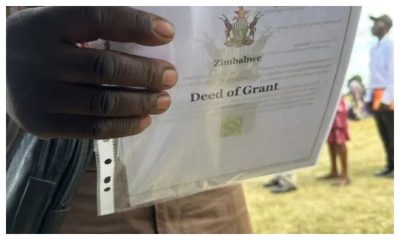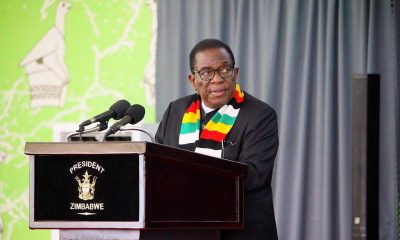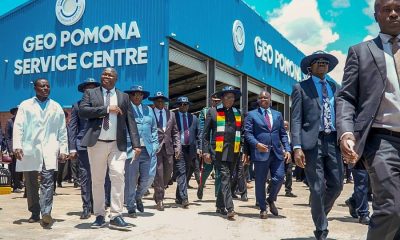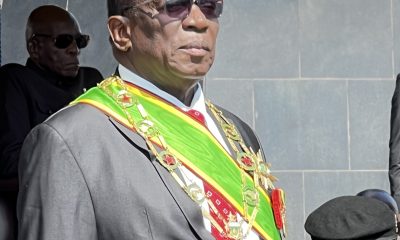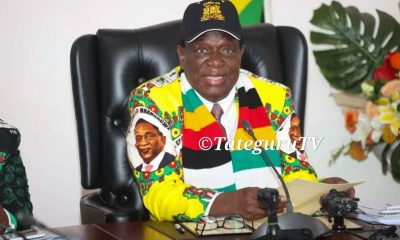Presidential Affairs
President Mnangagwa Returns From Global Development Summit in Qatar
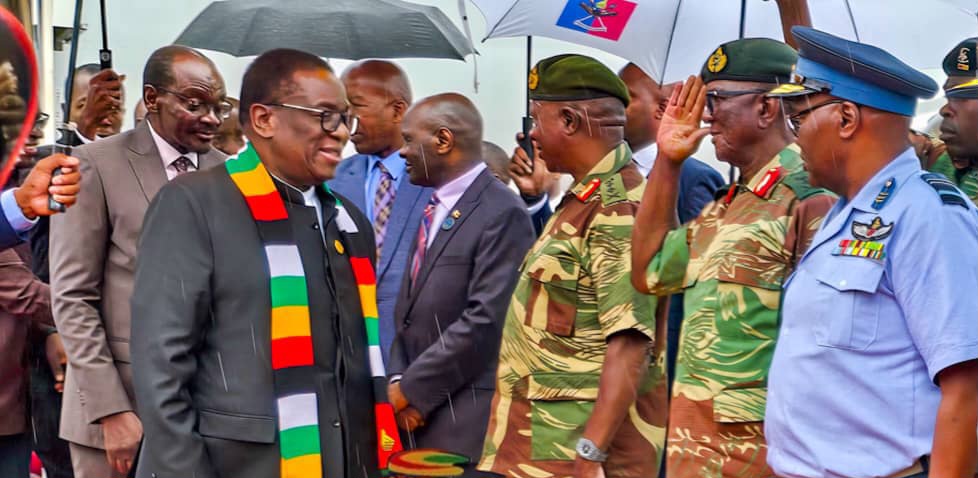
President Emmerson Mnangagwa is back in the country following his participation at the World Summit for Development held in Doha, Qatar.
The high-level gathering brought together world leaders to explore effective pathways toward inclusive and sustainable global growth.
During his address, President Mnangagwa shared Zimbabwe’s milestones in tackling poverty, improving access to quality education and healthcare, and enhancing social safety nets.
He reaffirmed the nation’s determination to realise the Sustainable Development Goals (SDGs) and the targets set under Vision 2030.
Upon his return at Robert Gabriel Mugabe International Airport, the President was welcomed by Vice President Colonel (Rtd) Dr Kembo Mohadi, senior Government officials, and members of the security services.
Presidential Affairs
Zimbabwe Pushes Back as Mnangagwa Blocks US Health Funding Framework
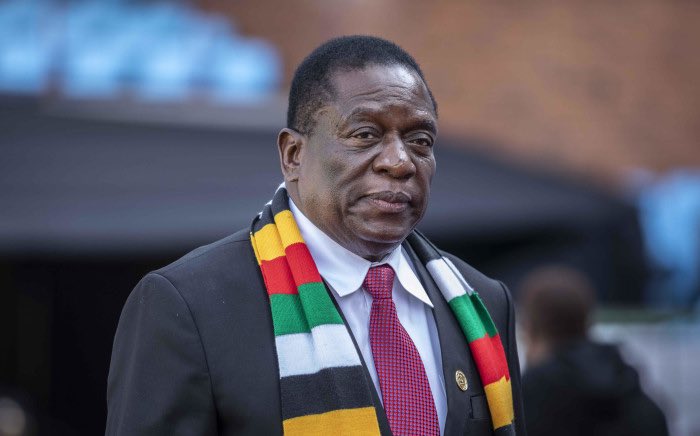
Takudzwa Karowangoro
Zimbabwe has formally pulled out of talks on a proposed US$350 million health-financing deal after President Emmerson Dambudzo Mnangagwa ordered an immediate suspension of the negotiations, citing serious concerns over national sovereignty.
The decision was communicated in a letter dated December 23, authored by Ambassador A.R. Chimbindi, the Secretary for Foreign Affairs and International Trade, and addressed to senior officials in the finance and health ministries. The move effectively ends months of engagement between Harare and the United States under Washington’s America First Global Health Strategy, which was being positioned as a new framework for future assistance.
Zimbabwean authorities took issue with provisions in the draft memorandum of understanding that would have granted the US long-term access to the country’s health data. Officials argued that such access posed risks to sensitive population-level information and amounted to undue external intrusion.
In the letter, Chimbindi stated that the President had directed government to immediately abandon discussions on what was described as a heavily skewed agreement that “compromises and undermines the sovereignty and independence of Zimbabwe.”
Negotiators were also alarmed by proposals to link Zimbabwe’s critical minerals sector to the health funding arrangement. Government advisers warned that such an inclusion could allow Washington indirect leverage over strategic economic sectors unrelated to public health but vital to Zimbabwe’s long-term development prospects.
While the draft agreement sparked resistance in Harare, the United States has made progress elsewhere, with more than a dozen African countries reportedly signing similar health cooperation deals.
By the time of publication, the US Embassy in Harare had not issued a response to requests for comment.
Government officials framed Zimbabwe’s withdrawal as a principled position on global health governance. They argued that entering into a bilateral health framework with Washington would be inconsistent with the country’s commitment to multilateral cooperation, especially given the US decision to distance itself from the World Health Organization during the administration of Donald Trump.
Officials maintained that endorsing a parallel health architecture would effectively legitimise a shift they believe weakened the global health system.
Zimbabwe’s stance, however, comes at a sensitive time. As the country disengages from Washington’s new funding model, it also faces the possibility of reduced American humanitarian support.
With the scaling down of USAID operations and internal US State Department signals pointing to an orderly withdrawal from several African countries, Zimbabwe risks losing long-standing assistance for HIV treatment, nutrition initiatives, and other essential programmes previously classified as lifesaving.
Presidential Affairs
“The Future Is in Your Hands” – President Mnangagwa
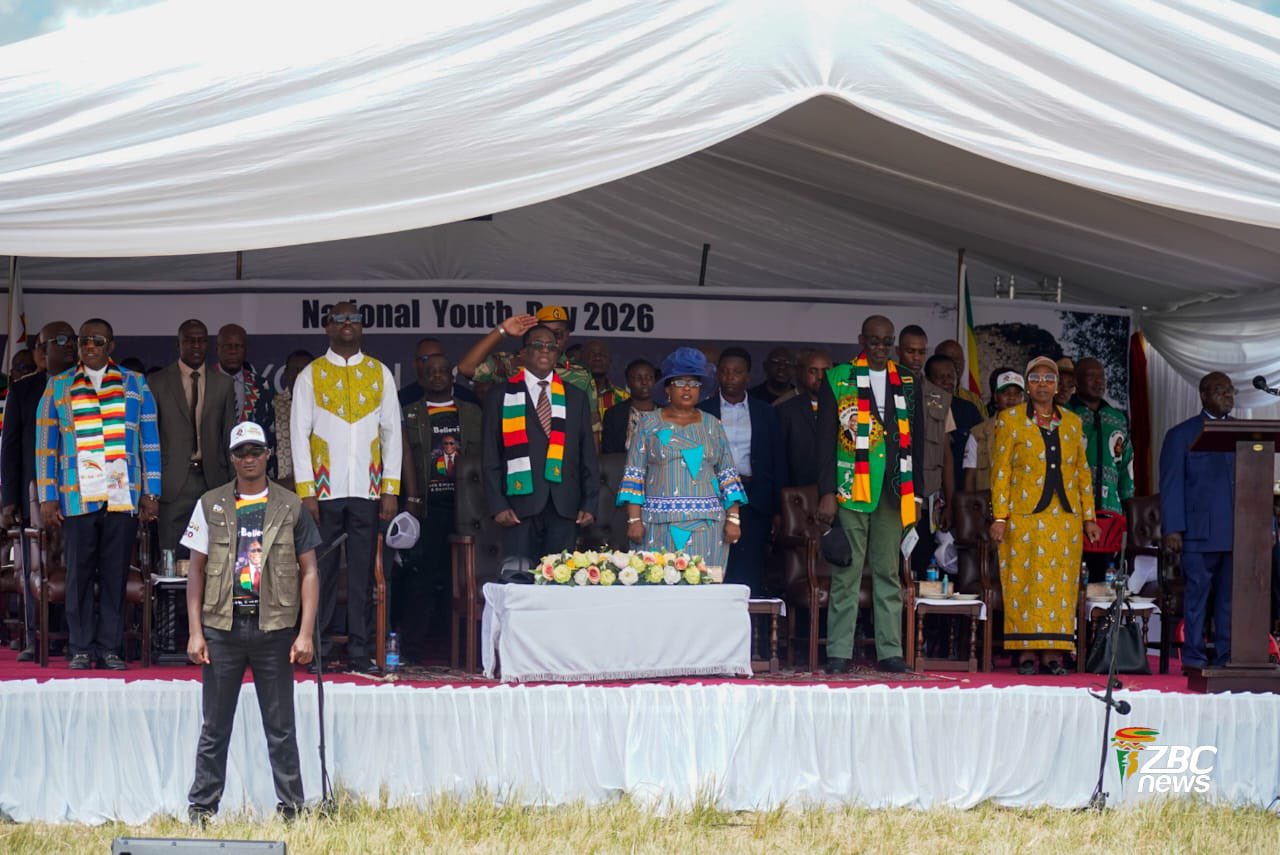
Itai Mazire
They came in their thousands a sea of young faces waving party regalia, chanting and dancing under the African sun.
From the streets of high-density suburbs to the remote villages of Mashonaland East, Zimbabwe’s youth descended on Igava Training Centre on Saturday, filling the air with a patriotism that moved even the President.
For a moment, as Emmerson Mnangagwa stepped onto the podium to commemorate National Youth Day, the roars of “Pamberi ne ZANU-PF” drowned out the wind sweeping across the vast grounds.
These were the children of the liberation struggle, and the message to them was clear — the fight is not over; it has simply changed form.
In a speech that alternated between paternal encouragement and revolutionary fire, the President warned the young generation to remain vigilant against what he described as a new wave of colonial influence.
“The shameful agenda of saboteurs, sell-outs and counter-revolutionaries, who seek to advance a neo-imperial agenda for ‘a few pieces of silver and false fame’, will never succeed.”
“As a sovereign nation and independent people, we make no apologies for our sacred duty to continuously defend and advance our national interest,” said President Mnangagwa.
The President, who is also First Secretary of ZANU-PF, commended the youth for their massive turnout, seeing in their energy a reflection of the revolutionary spirit of the 1970s.
However, he warned them against becoming spectators in their own future.
“Through political education, mobilisation and visibility, continuously win more young people into Party structures. Resist the temptation of being visible only during such commemorations.”
Beyond politics, there was a raw, parental plea. As grandmothers in the crowd nodded in agreement, Mnangagwa addressed the creeping crisis of drug and substance abuse that has consumed too many young lives.
“Regai mutoriro, tumbwa, mbanje ne guka. Resist, reject drug and substance abuse,” he said emphatically, switching between Shona and English for impact.
“The future of Zimbabwe is in your hands.”
The event was not just about rhetoric. The President toured exhibitions showcasing youth innovations in agriculture, technology and the arts, praising graduates of the Youth Service Programme.
He acknowledged that while the vision of an empowered, upper-middle-income society by 2030 is ambitious, it is attainable if the youth remain disciplined and industrious.
“You are not merely spectators in our ongoing development journey; you are active participants, demonstrating remarkable leadership,” he said.
For 22-year-old Tariro Moyo, a vocational training graduate from Manicaland who travelled to attend, the President’s words were personal.
“He spoke to us like we are his own children. He reminded us that we own this country. That means something,” she said, clutching a small Zimbabwean flag.
As the sun dipped behind the training centre, the celebrations continued.
But the message lingered: the youth are the wall against which enemies of the state will break.
“Nyika inovakwa, inotongwa, inonamatigwa nevane vayo,” said President Mnangagwa.
The land is built, ruled and prayed for by its owners.
Presidential Affairs
President Mnangagwa Drives Export Surge as Zimbabwe Records 30% Growth
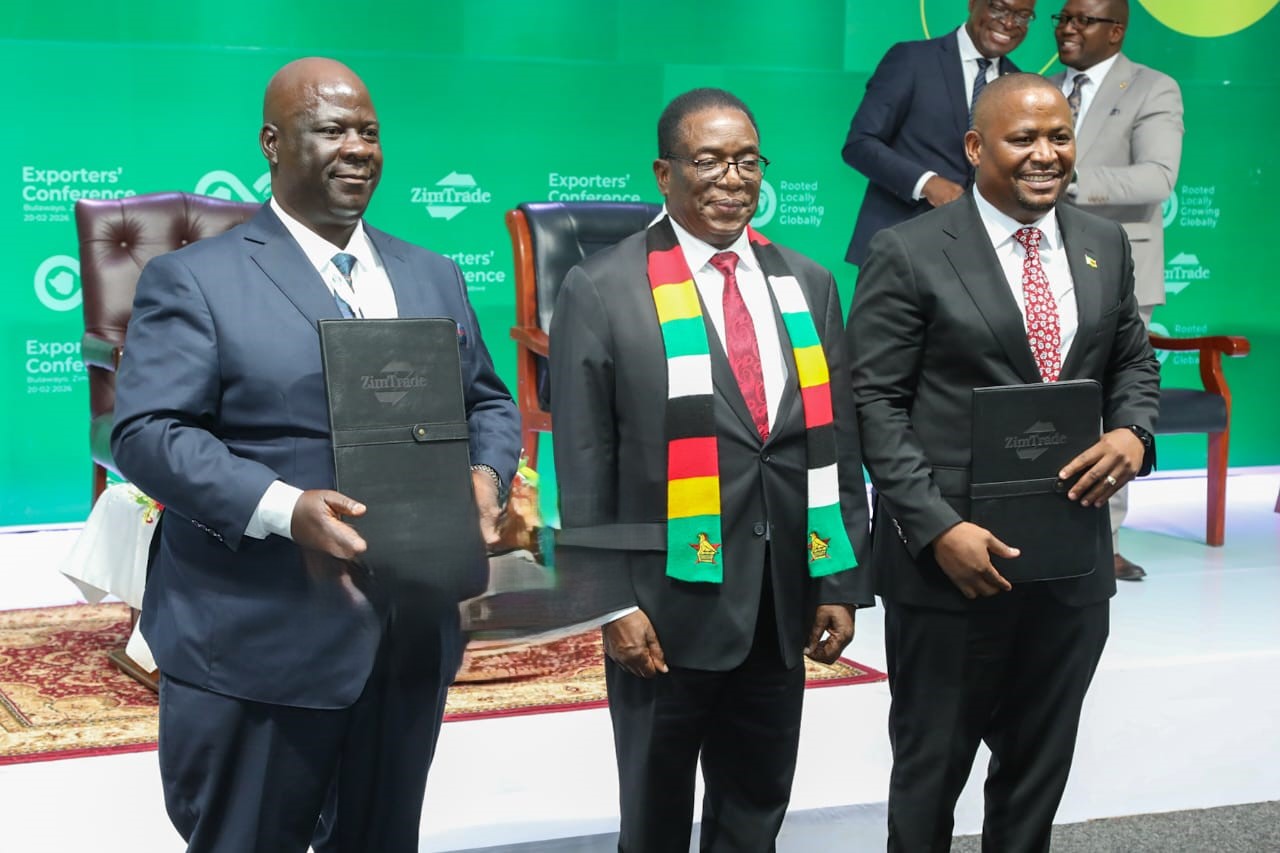
Zimbabwe’s export sector is surging ahead under the Second Republic, with President Emmerson Mnangagwa rallying industry leaders to deepen value addition and accelerate industrialisation as the country recorded a 30 per cent rise in exports in 2025.
Officially opening the 2025 ZimTrade Annual Exporters’ Conference at the Zimbabwe International Trade Fair (ZITF) in Bulawayo, President Mnangagwa said export-led growth was now central to the country’s transformation agenda under National Development Strategy 2 (NDS2).
Speaking under the theme “Rooted Locally, Growing Globally,” the President reaffirmed his administration’s commitment to building a competitive, diversified and value-driven export economy.
“Dependence on raw exports is no longer sustainable nor desirable. We must earn more from every tonne, every kilogramme, and every product we export,” President Mnangagwa said.
In a strong endorsement of Government reforms, ZimTrade Chief Executive Officer Mr Allan Majuru revealed that Zimbabwe’s exports rose sharply in 2025.
“Zimbabwe’s export performance has recorded encouraging growth. For the period January to December 2025, the country’s exports stood at US$9.71 billion, representing a 30% increase from the US$7.43 billion recorded over the same period in 2024,” Mr Majuru said.
The impressive growth reflects the impact of macroeconomic stability, targeted incentives, trade facilitation reforms and sustained investment in productive sectors championed by the Government.
President Mnangagwa underscored that Zimbabwe is decisively shifting from exporting raw materials to processing and beneficiation across key sectors.
In mining, he reiterated that Zimbabwe will no longer be content with exporting unprocessed minerals, with policy now firmly focused on local processing, downstream industries and technology transfer.
Agriculture is also transforming, with the tobacco industry moving from raw leaf exports toward finished cigarettes and related products. Revitalisation of the cotton-to-clothing value chain, expansion of horticulture exports and livestock production for leather beneficiation are being prioritised.
The President further challenged stakeholders to unlock greater value from forestry resources and expand production of processed foods, beverages, pharmaceuticals, engineering products and steel under the “Made in Zimbabwe” brand.
The Second Republic’s Whole-of-Government Approach to export competitiveness is yielding tangible results.
Key reforms include the Zimbabwe Electronic Single Window platform, which has significantly reduced paperwork and clearance times for exporters, enhancing efficiency and productivity.
Massive infrastructure development—spanning road rehabilitation, trade corridors, rail modernisation and logistics upgrades—is positioning Zimbabwean goods to reach regional and global markets more efficiently.
The President reaffirmed Zimbabwe’s practical and results-oriented commitment to the African Continental Free Trade Area (AfCFTA), urging businesses, particularly SMEs, to seize emerging regional opportunities.
In line with the national development philosophy of “leaving no one and no place behind,” President Mnangagwa stressed that export growth must benefit youth, women, rural producers and SMEs.
As the nation prepares to commemorate National Youth Day on February 21, he challenged young entrepreneurs to become innovators, digital traders and global exporters of value-added Zimbabwean goods and services.
Established corporates were urged to mentor and integrate youth into export value chains to ensure sustained industrial growth.
President Mnangagwa said Zimbabwe’s economic diplomacy thrust remains firmly focused on converting international relations into markets, investments and technology partnerships.
He directed ZimTrade and the Ministry of Foreign Affairs and International Trade to accelerate the establishment of warehousing and logistics facilities in strategic markets to enhance export penetration within the region, across Africa and beyond.
Declaring the conference officially open, the President called for unity and determination in advancing the country’s transformation agenda.
“Sector by sector, province by province, we all have the capacity to build a value-added, diversified and competitive export economy under National Development Strategy 2,” he said.
With exports surging and reforms firmly in motion, Zimbabwe’s path toward sustained industrialisation and upper-middle-income status continues to gain momentum under the Second Republic.
-

 Current Affairs3 months ago
Current Affairs3 months agoOperation restore order
-

 Crime and Courts5 months ago
Crime and Courts5 months agoMasasi High School Abuse Scandal Sparks Public Outcry
-

 Crime and Courts5 months ago
Crime and Courts5 months agoKuwadzana Man Jailed for Reckless Driving and Driving Without a Licence
-

 Current Affairs7 months ago
Current Affairs7 months agoBreaking: ZIMSEC June 2025 Exam Results Now Available Online
-

 Current Affairs6 months ago
Current Affairs6 months agoMunhumutapa Day: Zimbabwe’s Newest Public Holiday Set for Annual Observance
-

 Current Affairs5 months ago
Current Affairs5 months agoBREAKING NEWS: ZANU PF Director General Ezekiel Zabanyana Fired
-
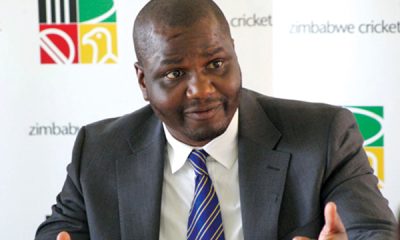
 Current Affairs6 months ago
Current Affairs6 months agoNo Racism in Our Cricket: Government
-

 Current Affairs6 months ago
Current Affairs6 months agoGovernment Bans Tinted Car Windows in Nationwide Crime Crackdown

